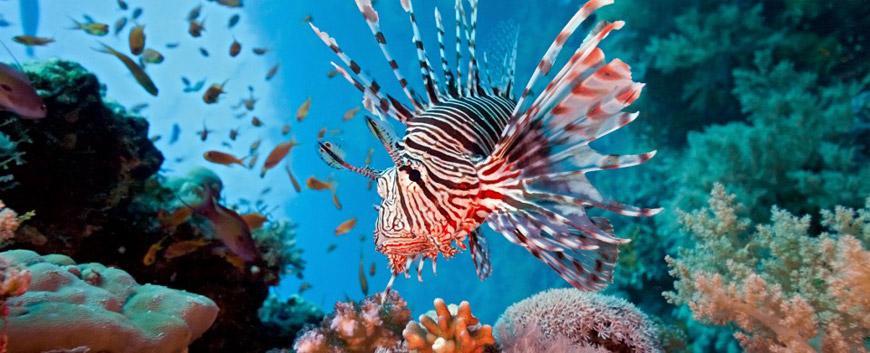- Local News
- Sun-2020-04-12 | 01:39 pm

Corals that lose their colour often do so as a result of environmental changes such as pollution and warming waters, a study by the National Ocean Service has shown. The study noted that the majority of the world’s coral reefs are predicted to die by the end of this century, if not sooner.
However, the reefs in the Gulf of Aqaba seem to be resisting the global phenomenon.
"Coral reefs are essential for the earth and the ecosystem. They provide shelter and habitats for many marine organisms. They also contribute to protecting coastlines from the damaging effects of waves and storms and are considered to be the source of nitrogen and other essential nutrients for marine food chains,” said Director of the Marine Science Station Ali Sawalmeh.
In remarks to The Jordan Times, Sawalmeh noted that, although corals nowadays are "prone to bleaching and subsequently to death when seawater temperatures exceed one or two degrees above the average as a dramatic effect of climate change, Red Sea coral reefs are known for their remarkable heat tolerance and resilience in facing climate change effects, as well as their survival for a longer time than usual”.
Given the uniqueness of the Aqaba corals, international environmental organisations, research centres and individual researchers have asked the Aqaba Special Economic Zone Authority (ASEZA) to study the features that differentiate the coral reefs in the Red Sea from everywhere else in the world, noted Sharhabeel Madi, ASEZA commissioner for tourism and economic development.
"As coral reefs are biodiversity reservoirs and significant sources of food and pharmaceuticals, scientists have been trying to uncover why the corals of the Gulf of Aqaba are withstanding warming temperatures,” noted the commissioner.
A study by The Royal Society showed that in some cases, the Red Sea corals’ symbiotic algae doubled the amount of oxygen they produced and showed a 51 per cent increase in primary productivity.
Environmentalists and diplomats from around the world are calling on UNESCO to declare the Red Sea reef a Marine World Heritage Site. In an article published in Policy and Practice Reviews, they noted that "the Gulf of Aqaba could potentially be one of the planet’s largest marine refuges from climate change”.
The article highlights that over half a billion people globally depend on coral reef ecosystems for food and income from tourism and fisheries and coastal protection, and an estimated 25 per cent of all marine species depend on coral reefs during at least some portion of their life cycles.
"The impending loss of the world’s coral reefs threatens the health and socio-economic well-being of hundreds of millions of people and could substantially disrupt multiple marine ecosystems,” the environmentalists and diplomats added.
The Red Sea’s reef, one of the longest continuous living reefs in the world, extends along 4,000 km of the sea’s shorelines, but "the unique portion of the Red Sea’s reef will only survive and flourish if serious regional environmental challenges are addressed”, according to the article.
Sawalmeh echoed these claims, saying: "The corals of the Gulf of Aqaba will only survive and flourish if serious mitigation measures to protect it are adopted, supported with effective scientific research, against anthropogenic stressors combined with the effects of warming seawater that damage corals.”
"The advantage we have in Aqaba is that not only are the coral reefs flourishing in the Red Sea, but so are hundreds of unique varieties of marine life. This creates a very attractive spot for diving and other tourism activities,” added Madi.
During a phone interview with The Jordan Times, Madi noted: "When the commercial port was moved to the Southern Beach of Aqaba where special kinds of coral reefs live, we made sure to transfer them to a safer place in a scientific and environmentally-safe way.”
Aiman Soleiman, adviser for environmental affairs at ASEZA, said: "The corals are not exactly resistant to bleaching, they are actually more resistant to climate change, the cause of bleaching.”
"Being geographically at the northern tip of the Red Sea, the water’s PH [a measure of acidity] and temperature tends to be relatively stable throughout the summer and winter, which helps the corals remain safe from bleaching,” he told The Jordan Times in a phone interview.
Soleiman added that, according to studies, the water changes in a cycle every three years, which helps its chemistry remain stable.
So far, 157 species of hard corals were recorded, which constitutes around 45 per cent of the known hard corals in the Red Sea, he said.
"More than 100 species of soft corals are inhabiting the underwater of Aqaba,” he said, adding: "The endemism at the Gulf of Aqaba is high, with 11 species out of 23 endemic species recorded in the Red Sea. This means that 65 per cent of the endemic species of the Red Sea are recorded in Aqaba of Jordan.”
To protect the corals and other marine life, a zero discharge policy has been implemented in the Gulf of Aqaba since 1999.
"Usually, bleaching happens when the water temperature is above 30° Celsius, which often happens as a result of industrial cooling systems. There are three plants that use that system in Aqaba, but ASEZA’s strict rules require that the water is cooled down to at least 3 degrees under 30° Celsius before going back into the sea,” Soleiman said.
He also noted that the Marine Park, which serves as a reservoir for some kinds of corals, stretches over seven kilometres of coastline, with science stations also protecting other portions of the coastline.
A newly established Transnational Red Sea Centre, based at the Ecole Polytechnique Fédérale de Lausanne in Switzerland, was launched in March of 2019 and aims to foster "crucial regional scientific collaboration”, according to Sawalmeh.










